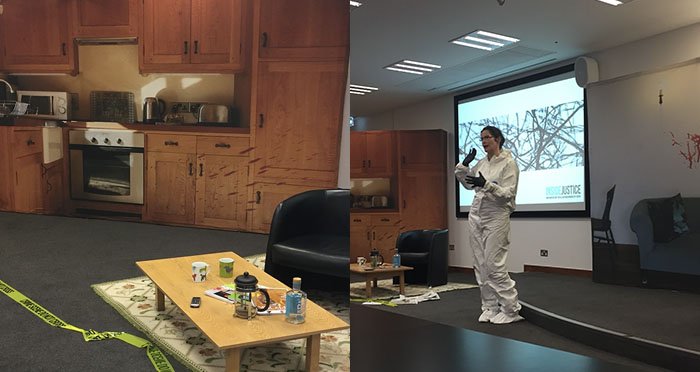Digital forensics is a growing area, but don’t be fooled into thinking it’s infallible

Any law student would, rightly, be terrified to walk into a crime scene complete with blood spattered walls and bright yellow forensic tape in their lecture theatre. But that’s the sight that recently greeted BPP Law School students in their Waterloo campus.
Thankfully, no murder had taken place — instead the scene played backdrop to charity Inside Justice’s interactive Crime Live event, where forensic scientists and audience members work together to investigate the fictional killing of a 28-year-old primary school teacher.
Bloodied fingerprint marks and a shattered backdoor window intrigued the event’s protective clothing-clad scientists, Tracy Alexander and Jo Millington. The pair — both fully-fledged forensic experts — kept the audience entertained during the three-hour event with their comedy duo-style delivery and interesting facts (one of the best of which I’ve included at the bottom of this piece). Alexander and Millington will be starring alongside other members of the Inside Justice team in a new series of BBC Two’s Conviction.
Back to the murder scene, and Alexander and Millington were too attracted to a blood stain on the ‘9’ key of the victim’s old-school Nokia phone, placed on the table of the faux kitchen alongside a bottle of alcohol. The blood matched the victim’s, her husband claiming it was him that made the stain after cradling his wife’s body then ringing 999.
Mobile phones — albeit less so a retro Nokia — can prove vital in the investigation of crime beyond the physical evidence they harbour. “People share everything about their lives nowadays,” says Millington, “our mobiles are just so involved in our everyday lives. In evidence, it’s quite remarkable what you can glean from them.”
This is because mobile phone users leave data trails without even realising it.
At a three-week exhibition near Leicester Square, The Glass Room, visitors learnt that when phone users cross public WiFi zones (a Starbucks, a train station) a note of this is made on their device even if they do not manually connect to the free internet. The privacy law implications of this are, of course, startling, but from a crime investigation point of view it helps the authorities paint a picture of victims’ and suspects’ movements.

Geoffrey Vos, a top judge, thinks the impact of this is felt not just in the detection of criminals but the criminal trial process, too.
In a recent speech the Chancellor of the High Court noted that “most people carry their smartphones on their person at all times with their GPS location switched on” and that this may result in “far fewer” contested criminal cases. Because “the location of all persons is continuously uploaded to the cloud”, he says, there will “be far fewer identity issues in criminal cases”.
Indeed, at the Inside Justice event, when intelligence analyst Sam Robins was asked whether some defendants had had their Google Timelines or Snap Maps used in evidence against them, she replied: “Yes — lots of people!”
What digital forensics isn’t, though, is conclusive proof of guilt. For starters, “mobile devices are not superglued to users’ hands and can be swapped among friends or stolen”, says the commercial director of one well-known forensics business.
Ruth Morgan, the Director of the UCL Centre for the Forensic Sciences, echoes these concerns when she tells me that while “mobile phone technology and the data produced is a really interesting and growing field”, forensic science generally is simply “not as infallible as it is assumed to be”. Of the 996 cases heard in the Court of Appeal between 2010 and 2016 involving criminal evidence, rulings in 218 (22%) were argued to be unsafe as they contained misleading evidence.

Specific areas in which we should remain cautious include the reliability of hair-strand evidence. Matching suspect’s hairs to those found at a crime scene is not an objective science and depends on experts’ take on whether the hairs match. Donald Gates knows this too well: he was convicted (and served 28 years in prison) in the United States for a rape and murder after an FBI analyst testified that hairs found on the victim’s body matched Gates’. He was exonerated when DNA testing revealed the hairs didn’t belong to him.
Similarly worrying is research into ‘touch DNA’, which shows epithelial cells can be transferred via handshake. Researchers from the University of Indianapolis found that the DNA profile of a person who had never touched the knife used in the experiment, but had shaken the hand of the person who had, appeared in 85% of samples.
In a recent TED Talk, Morgan hammered the importance of this forensic science frailty home when she invited audience members to think about how they’d feel if they were accused of a crime that they didn’t commit:
“Imagine you’re standing in the court, and the expert is explaining to the judge how that hair, that fibre, how your DNA, is cast iron proof of your guilt. But you know you’re innocent. But you know it’s you vs science.”
It’s doesn’t bear imagining. Unfortunately, some people don’t have to.
An interesting fact from Crime Live
Various phones allow you to unlock your phone with your fingerprint, but would the phone unlock if the finger used belongs to a dead person? The answer is no, says Alexander, who puts this down to dead bodies’ missing electricity. However, if you were to replace this electricity artificially, for example by running a car battery through the deceased person’s arm, then, yes, the phone would unlock.
